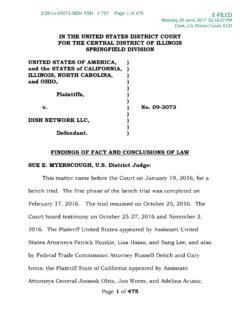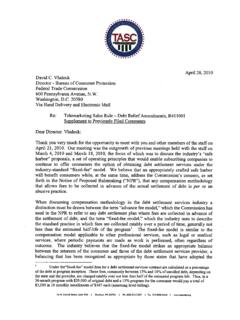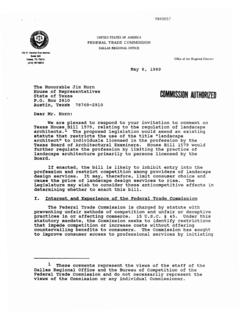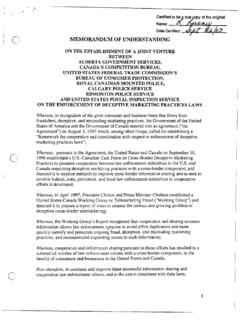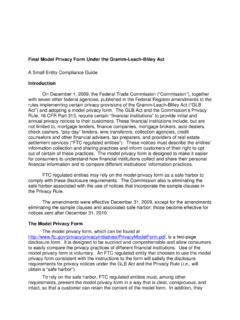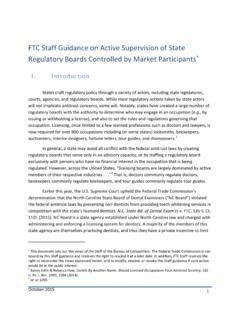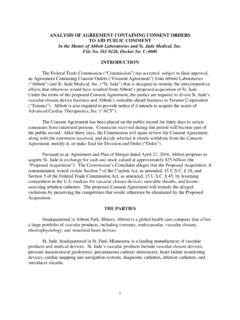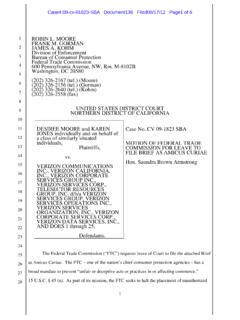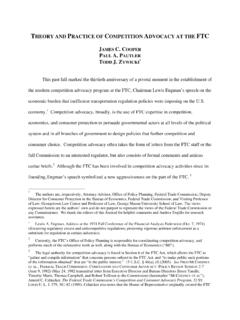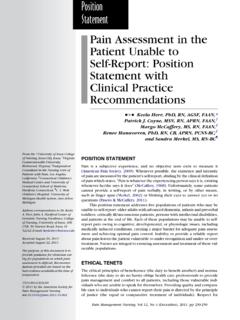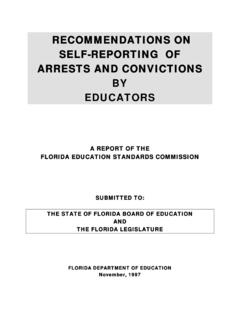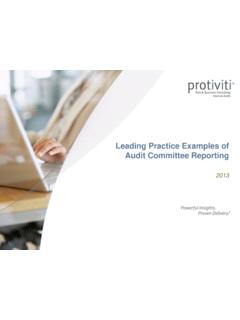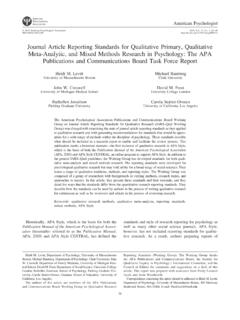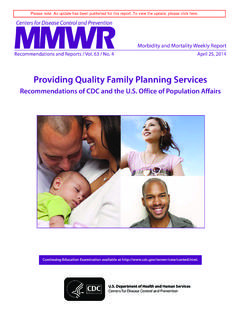Transcription of RECOMMENDATIONS FOR BUSINESSES AND …
1 RECOMMENDATIONS FOR. BUSINESSES AND POLICYMAKERS. FTC REPORT. FEDERAL TRADE COMMISSION | MARCH 2012. RECOMMENDATIONS FOR. BUSINESSES AND POLICYMAKERS. FTC REPORT. MARCH 2012. CONTENTS. Executive Summary .. i Final FTC Privacy Framework and Implementation RECOMMENDATIONS .. vii I. Introduction.. 1. II. Background .. 2. A. FTC Roundtables and Preliminary Staff Report.. 2. B. Department of Commerce Privacy Initiatives.. 3. C. Legislative Proposals and Efforts by Stakeholders.. 4. 1. Do Not Track.. 4. 2. Other Privacy Initiatives.. 5. III. Main Themes From Commenters.. 7. A. Articulation of Privacy Harms.
2 7. B. Global Interoperability.. 9. C. Legislation to Augment self -Regulatory Efforts .. 11. IV. Privacy Framework.. 15. A. Scope.. 15. 1. Companies Should Comply with the Framework Unless They Handle Only Limited Amounts of Non-Sensitive Data that is Not Shared with Third Parties.. 15. 2. The Framework Sets Forth Best Practices and Can Work in Tandem with Existing Privacy and Security .. 16. 3. The Framework Applies to Offline As Well As Online Data.. 17. 4. The Framework Applies to Data That is Reasonably Linkable to a Specific Consumer, Computer, or Device.. 18. B. Privacy by Design.
3 22. 1. The Substantive Principles: Data Security, Reasonable Collection Limits, Sound Retention Practices, and Data .. 23. 2. Companies Should Adopt Procedural Protections to Implement the Substantive .. 30. C. Simplified Consumer Choice.. 35. 1. Practices That Do Not Require .. 36. 2. For Practices Inconsistent with the Context of their Interaction with Consumers, Companies Should Give Consumers Choices.. 48. D. Transparency .. 60. 1. Privacy Notices.. 61. 2. Access.. 64. 3. Consumer Education.. 71. V. Conclusion .. 72. FTC Privacy Milestones Personal Data Ecosystem Dissenting Statement of Commissioner J.
4 Thomas Rosch EXECUTIVE SUMMARY. In today's world of smart phones, smart grids, and smart cars, companies are collecting, storing, and sharing more information about consumers than ever before. Although companies use this information to innovate and deliver better products and services to consumers, they should not do so at the expense of consumer privacy. With this Report, the Commission calls on companies to act now to implement best practices to protect consumers' private information. These best practices include making privacy the default setting for commercial data practices and giving consumers greater control over the collection and use of their personal data through simplified choices and increased transparency.
5 Implementing these best practices will enhance trust and stimulate commerce. This Report follows a preliminary staff report that the Federal Trade Commission ( FTC or Commission ) issued in December 2010. The preliminary report proposed a framework for protecting consumer privacy in the 21st Century. Like this Report, the framework urged companies to adopt the following practices, consistent with the Fair Information Practice Principles first articulated almost 40 years ago: xx Privacy by Design: Build in privacy at every stage of product development;. xx Simplified Choice for BUSINESSES and Consumers: Give consumers the ability to make decisions about their data at a relevant time and context, including through a Do Not Track mechanism, while reducing the burden on BUSINESSES of providing unnecessary choices; and xx Greater Transparency: Make information collection and use practices transparent.
6 The Commission received more than 450 public comments in response to the preliminary report from various stakeholders, including BUSINESSES , privacy advocates, technologists and individual consumers. A. wide range of stakeholders, including industry, supported the principles underlying the framework, and many companies said they were already following them. At the same time, many commenters criticized the slow pace of self -regulation, and argued that it is time for Congress to enact baseline privacy legislation. In this Report, the Commission addresses the comments and sets forth a revised, final privacy framework that adheres to, but also clarifies and fine-tunes, the basic principles laid out in the preliminary report.
7 Since the Commission issued the preliminary staff report, Congress has introduced both general privacy bills and more focused bills, including ones addressing Do Not Track and the privacy of teens. Industry has made some progress in certain areas, most notably, in responding to the preliminary report's call for Do Not Track. In other areas, however, industry progress has been far slower. Thus, overall, consumers do not yet enjoy the privacy protections proposed in the preliminary staff report. The Administration and certain Members of Congress have called for enactment of baseline privacy legislation.
8 The Commission now also calls on Congress to consider enacting baseline privacy legislation and reiterates its call for data security legislation. The Commission is prepared to work with Congress and other stakeholders to craft such legislation. At the same time, the Commission urges industry to accelerate the pace of self -regulation. i The remainder of this Executive Summary describes key developments since the issuance of the preliminary report, discusses the most significant revisions to the proposed framework, and lays out several next steps. DEVELOPMENTS SINCE ISSUANCE OF THE PRELIMINARY REPORT.
9 In the last 40 years, the Commission has taken numerous actions to shape the consumer privacy landscape. For example, the Commission has sued dozens of companies that broke their privacy and security promises, scores of telemarketers that called consumers on the Do Not Call registry, and more than a hundred scammers peddling unwanted spam and spyware. Since it issued the initial staff report, the Commission has redoubled its efforts to protect consumer privacy, including through law enforcement, policy advocacy, and consumer and business education. It has also vigorously promoted self -regulatory efforts.
10 On the law enforcement front, since December 2010, the Commission: xx Brought enforcement actions against Google and Facebook. The orders obtained in these cases require the companies to obtain consumers' affirmative express consent before materially changing certain of their data practices and to adopt strong, company-wide privacy programs that outside auditors will assess for 20 years. These orders will protect the more than one billion Google and Facebook users worldwide. xx Brought enforcement actions against online advertising networks that failed to honor opt outs. The orders in these cases are designed to ensure that when consumers choose to opt out of tracking by advertisers, their choice is effective.
